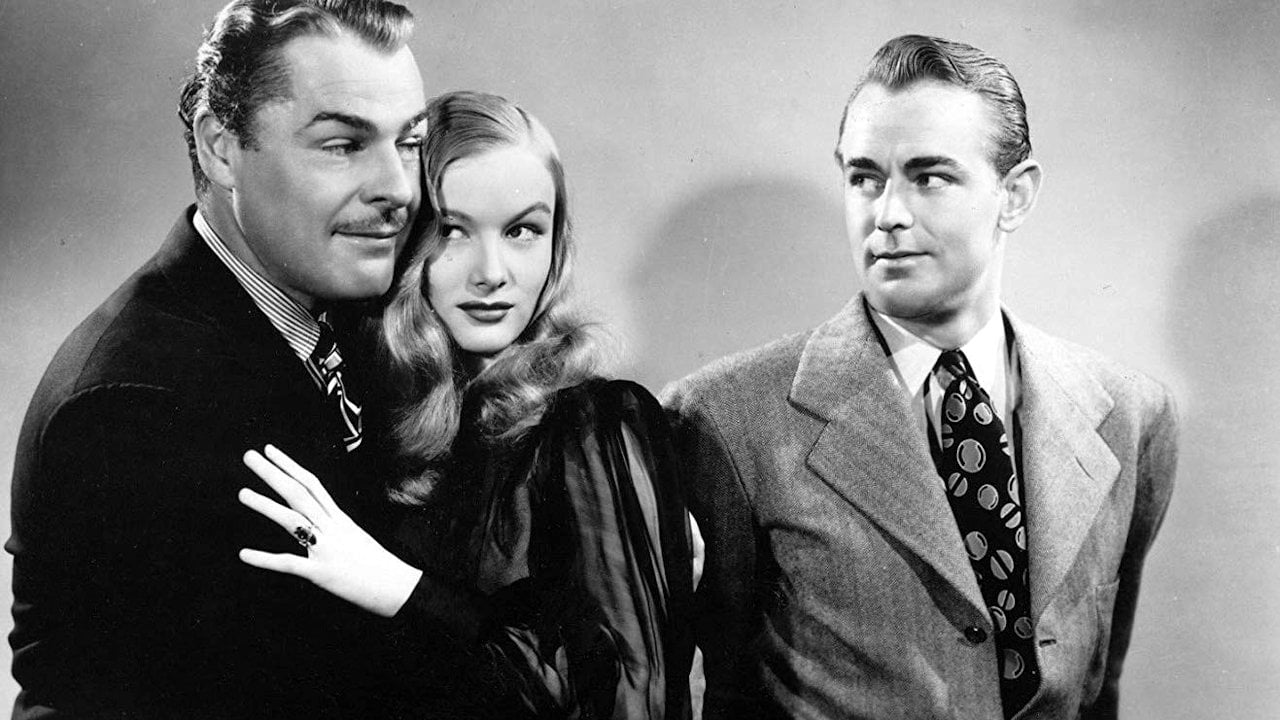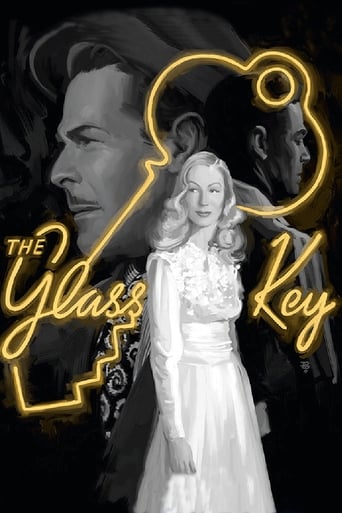

The B-movie branded film noir is a special thing. Not especially observant that they are, in fact, a film noir, and unwilling to milk their potentially stylish undertones, they work only in economic profusion, cutting to a murder here, a mugging there, a kiss here, a bloody climax there. Not every noir can be a coffee-stained greaser like "Raw Deal", but there's something wondrous about a pulp story that was, most likely, churned out by the studio in a hasty attempt to make money and still makes something special."The Glass Key" isn't quite a B-movie — it was distributed by Paramount and starred power screen couple Alan Ladd and Veronica Lake — but it is reminiscent of one. It's attempting to tell a story of corruption, deception, and its other disasters (with low-budget effect); yet, perhaps accidentally, it becomes a film noir of unique ambition, with its impeccable starring (and supporting) turns and hard-boiled writing.Adapted from Dashiell Hammett's novel of the same name and a remake of the 1935 film starring George Raft, "The Glass Key" stars Ladd as Ed Beaumont, the right-hand-man to Paul Madvig (Brian Donlevy), a corrupt political boss. When Madvig isn't throwing opponents out of hotel windows or telling his henchman Jeff (William Bendix) to beat an enemy to death, he's chuckling at crude jokes and falling for tough broads. In "The Glass Key", he falls in love with Janet (Veronica Lake), the daughter of reform candidate Ralph Henry (Moroni Olsen). Beaumont isn't so sure that the romance is a very good idea — Janet's motives are shaky, considering her background — and he would be right: she is increasingly drawn to Beaumont while remaining disgusted by the brutish Madvig.Things get worse for the boss and his sidekick when Madvig's sister's (Bonita Granville) lover, who he openly disliked, is found murdered in the street. The press, along with the people, believe that Madvig is responsible. Despite knowing that his employer isn't hardly a man of clean morals, Beaumont knows that he wasn't at fault, forced to clear his name in a town of beasts that would do anything to stop the truth from coming out.At only 82 minutes, "The Glass Key" hardly has enough time to go into much detail when regarding its corrupt characters, but within its short time, it successfully establishes a ferocious atmosphere, taking more time analyzing merciless beatings than the eventual romance between Ladd and Lake. The film is essentially a murder mystery; we want Madvig to be the killer — he's an asshole who sounds slightly like a demented Fozzie Bear — but things aren't as simple as we would like. As Beaumont attempts to do the right thing, he also has to get his hands dirty. "The Glass Key" thrives in a world where the sun doesn't shine. Love is a rarity among the relentless malfeasance.With his sly smile reminiscent of a young Humphrey Bogart, Ladd brings a tough-guy charisma to the screen at a dogged pace; his chemistry with the iconically provocative Lake works so well because they're both so subtly, to put it mildly, cool. And with the puff of a cigarette, a swig of bourbon, and a kiss on the lips, "The Glass Key" acts as an icily appealing noir that boasts a considerable amount of on screen allure.
... View More"The Glass Key" should have served as the model for all subsequent films based on hardboiled crime fiction. Brian Donlevy, Alan Ladd, William Bendix and tiny, delectable Veronica Lake all seem born to play their parts: Ladd, in particular, is perfect as the snappy, no-nonsense Ed Beaumont. Director Stuart Heisler gets the bleak atmosphere down pat. And, most important of all, the script is true to the morally ambiguous vision of Dashiell Hammett (except for that minor but cringe-inducing change to the ending, of course). There are no "good guys" in this tale: some of the characters behave much more reprehensibly than others, but there are only degrees of bad. This is what made Hammett's writing special, and it's why "The Glass Key" stands head and shoulders above many other, better-known examples of film noir like Howard Hawks' wildly inconsistent adaptation of Raymond Chandler's "The Big Sleep". (In the scene during which Ladd is held captive and roughed up by Bendix, Akira Kurosawa fans will immediately recognize the inspiration for a pivotal scene in the Japanese master filmmaker's "Yojimbo".)
... View MoreDashiell Hammett's writing style is by and large acknowledged as being exceedingly beneficial to movie interpretations. It's handsomely evocative of atmosphere and situation and the angle is practically always that of a neutral onlooker, a stand-in for the audience. The Glass Key and Miller's Crossing signify two distinguishing readings of Hammett. The former is a straightforward conversion, the latter takes basics from Red Harvest and then sets them afloat in a plot which reverberates with a virtual mirror image of The Glass Key but also wanders gamely into original ideas.This second and better known adaptation of the classic Hammett novel, released just seven years after the first, focuses more on the political stratagem and one particular murder which functions to throw a dainty milieu of suspicion and caginess into disarray, flaunting a murder mystery accompanied by a backdrop of politics, gambling kingpins, flirtation and almost farcically eager brutality. A vital part of Stuart Heisler's almost Hawksian version is the casting of Ladd as Ed. Hammett wrote about commanding but aloof guys, who demonstrate a stiff and closely controlled style of code and who seldom show feeling or vulnerability. His hard cases were pessimistic, solidly committed to their work, unscrupulous, plucky, and apparently not influenced to feelings. Ladd wears some of these characteristics with his physical look, taut and severe, keeps his actions in check to look cool and unruffled. He punches only one character, though it's just a calculated move instead of a ceremony of bluster. The only actual aggression that Ed makes use of is an unsurprisingly brusque and snappy reply to the aggravation of Richard Denning.The physical stiffness and steadfast temperament of this character is a bit diluted by Ladd's compromises in playing Ed as good-humored and affable. His recuperation from a savage pounding becomes a spell where he, like 007, flirts with nurses. The pressure of Ladd's assumed role, an up-and-coming matinée icon and celebrity, appears to have permeated the portrayal of Ed and modified the Hammett protagonist into something resembling a Hollywood negotiation. On the other hand, Brian Donlevy takes advantage of his character being the political organizer who wrestled his way up from bottom, while Ladd is just his henchman and sounding board. Veronica Lake is the fickle daughter of the gubernatorial nominee who initially makes a play for Donlevy but dithers between him and Ladd, while Joseph Calleia has the gambling house franchise throughout the metropolis. Merged skillfully, the effect is an amusing thriller.The most thrilling, as well as the funniest, and most loaded scene is definitely the epic battering incurred by Ladd in a spell of amusingly forward sado-masochism as William Bendix bashfully pleads for his "little rubber ball" to spring back for more. Filmed and performed with misleading airiness, the scene is key to the film, parading a sensual riptide that plants ongoing suspicions throughout. Tinkering with his customary pokerface as he twists cagily through a labyrinth of political intrigues and underworld traps in the name of his superior, Ladd stays just as ice-covered whether conveying his passion for Lake or his allegiance to Donlevy. The effect is a taunting sexual vagueness, significantly augmented, at least until the excuse finale, by the fact that Hammett's protagonist, here thick-skinned enough to confess a readiness to throw Lake under the bus if required in furtherance of his intentions, has been case-hardened by being abridged into a star mouthpiece for movie-going audiences. But man, love that William Bendix. His entire role is comprised of wanting nothing more than to beat Ladd into a pulp, and is insatiably enjoyable at being a big lug with nothing more on his mind.
... View MoreThe Glass Key is a rather convoluted, tepid film made on the heels of successful teaming of Veronica Lake and Allan Ladd in This Gun for Hire. While both films are amply dark and sadistic noirs, Key is the more muted and unimaginative, blunting its ambiguity with the lead on the road to reform in the first reel. One time crooked pol Paul Madvig (Brian Donlevey) is making things hot for the criminal element in the town. Once in the mob's pocket he now busts up the gambling joints he used to protect.Falling for a reformer's daughter Janet Henry ( Lake) he throws in with him. Janet though has taken a shine to his right hand man Ed Beaumont (Ladd) which severs his relationship with Paul. When reformer Henry's n'er do well son who is dating and exploiting Paul's sister is murdered the mob hopes to implicate Paul, whether he did it or not. Confusing it is, suspenseful it's not.Lake and Ladd once again match up well but their situation pales in comparison to Hire and implausible moments abound. There are dark enough moments to qualify it as such as William Bendix's cruel thug who enjoys his work displaying an almost homo erotic delight in pummeling Beaumont while Beaumont in turn finds pleasure in watching a hood being strangled in front of his eyes. But with Donlevy's Madvig compromised early and Lake's Janet lacking the killer instinct of fatales that would follow her The Glass Key doesn't unlock much.
... View More